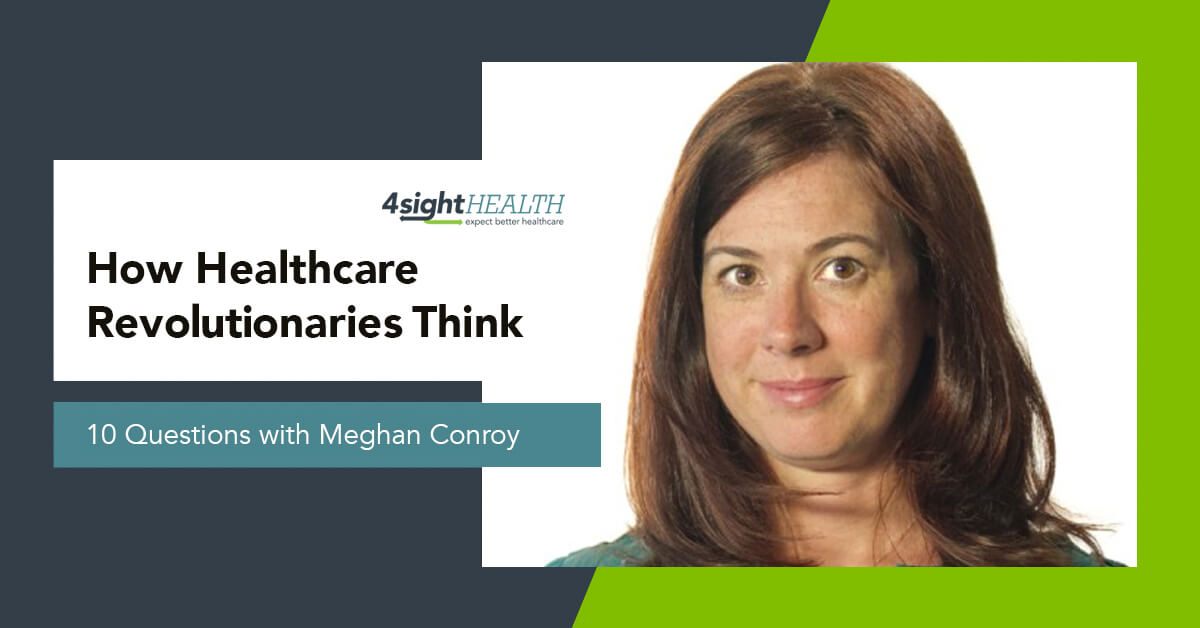April 26, 2022

How Healthcare Revolutionaries Think: 10 Questions with Meghan Conroy
Welcome to the latest installment of 4sight Health’s series, How Healthcare Revolutionaries Think. Our interview series profiles healthcare instigators who believe that outcomes matter, customers count and value rules.
They say a picture is worth a thousand words. Nobody says a picture is worth a thousand lives. But they might if CaptureProof and its founder, Meghan Conroy, have their way.
CaptureProof is a San Francisco-based clinical photo and video platform that physicians can use to document patient progress. This can be done at visits or as part of their virtual-care protocols to objectively monitor patients’ status and progress. Think fall risk or quality of motion after a stroke, post-op, wound care and things that suddenly appear on your skin that you’re not quite sure of.
What I wasn’t sure of was how Conroy got to this point in her career after starting off as a drug company sales rep. So, we talked about it. Here’s what she had to say in our recent interview.
1. If you looked up healthcare revolutionary in a dictionary, what would the entry say?
Conroy: Madam Curie
2. OK, I get it. What makes Madam Curie a healthcare revolutionary? What are the attributes of a healthcare revolutionary
 Conroy: Healthcare revolutionaries like Madam Curie are people who are willing to question the norm. Like that doctor, Ignaz Semmelweis, M.D., who finally got people to wash their hands before going into surgery and suddenly infection rates went down. Most people perceive healthcare to be this evidence-based thing. That every decision is based on the evidence. But that’s not true. Healthcare really is a mix of art and science. A healthcare revolutionary is someone who can marry art and science and come up with something new that challenges the norm. I feel like I’m describing myself, and that’s a little weird.
Conroy: Healthcare revolutionaries like Madam Curie are people who are willing to question the norm. Like that doctor, Ignaz Semmelweis, M.D., who finally got people to wash their hands before going into surgery and suddenly infection rates went down. Most people perceive healthcare to be this evidence-based thing. That every decision is based on the evidence. But that’s not true. Healthcare really is a mix of art and science. A healthcare revolutionary is someone who can marry art and science and come up with something new that challenges the norm. I feel like I’m describing myself, and that’s a little weird.
3. Maybe you are describing yourself. You have an undergraduate degree in physiology, and you have a graduate degree in digital photography. Why physiology?
Conroy: I studied physiology because as a child you have very few things that you know that people do when they get older, and a doctor is one of them. And I thought the body was cool from an early age. I mean, the body is magic. A physiology degree gave me an appreciation for the magic. I walked around campus thinking it was fascinating that we all actually existed. That our chromosomes came together in just the right way. You can watch a cut heal. It’s like science fiction in our own bodies.
4. But you didn’t become a doctor like many of the people we interview for this series. They wanted to be doctors but ultimately chose another path. Why did you?
 Conroy: Well, the first sign was something that happened to another student on my floor in the dorm. She was in a terrible car accident and had a lot of stitches on her face. Seeing her made it very clear to me that I was actually never going to really want to do medicine. Then I volunteered at an emergency room just to be sure, and every week I fainted. It wasn’t the stitches or the blood. My trigger was people in pain or expressing pain. I go vasovagal, so I faint. My advisor, who was a very nice man and looked like Santa Claus, said to me, “Well, you like to talk. There must be people who sell things to doctors. Go sell to doctors.” That’s how I ended up at Abbott Laboratories and Johnson & Johnson. I probably was in and out of more than 10,000 doctors’ offices during that time.
Conroy: Well, the first sign was something that happened to another student on my floor in the dorm. She was in a terrible car accident and had a lot of stitches on her face. Seeing her made it very clear to me that I was actually never going to really want to do medicine. Then I volunteered at an emergency room just to be sure, and every week I fainted. It wasn’t the stitches or the blood. My trigger was people in pain or expressing pain. I go vasovagal, so I faint. My advisor, who was a very nice man and looked like Santa Claus, said to me, “Well, you like to talk. There must be people who sell things to doctors. Go sell to doctors.” That’s how I ended up at Abbott Laboratories and Johnson & Johnson. I probably was in and out of more than 10,000 doctors’ offices during that time.
5. What did you like about being a sales rep and talking to doctors all the time?
Conroy: I wasn’t the typical pharmaceutical rep. I had a degree in physiology. I talked science with these guys. I was really into that. Neuro became the specialty that I gravitated to because, well, it’s very nerdy, neuro. It’s very analytical. It’s very data driven. And I was intrigued by that.
6. Let’s talk about your jump from physiology into digital photography. Why?
Conroy: After the pharmaceutical sales rep days I worked for a small startup. They did a flip, and I got a sand bucket full of cash. I really thought I was rich. So, I decided to move to Paris and go to photography school. I love photography. I’m visual. That’s the way I communicate with the world. If you were sitting next to me, I’m sure by now I would have pulled out my phone and shown you three pictures. I’m a very show-and-tell type of person. To tell a story with images was always something I was interested in. I was 16 and I asked my parents for a tripod. So yeah, it seemed like the right time to dive into that. So, I did.
7. How did you get into medical photography?
Conroy: It was an unplanned event that became a fortuitous event. I just happened to be sitting next to a guy who was in research and development at a life sciences company on a six-hour plane ride. He said he was looking for a photography solution for a clinical research trial. It was a post-lumpectomy breast reconstruction trial, and they needed someone to take before-and-after photos of women in the trial. I asked him how much he was paying. After he told me, I picked my jaw up off the floor and said, “I could do something for you for way, way less.” That’s when CaptureProof found me. I know it sounds cheesy, but it did. That was 2008. I founded CaptureProof four years later, and I’ve been dedicated to bringing the company to life ever since.
8. You quit your job and moved to Paris without another job. You did your graduate thesis in Zambia, taking family portraits of more than 1,000 families. You downhill ski. None of these are on my bucket list. What do they say about you? Are you a risk taker? Are you fearless?
 Conroy: I am not a downhill skier! I would not put myself in that category. But I do ski, and I snowboard. I mean, of course everybody worries. But I had this wonderful woman who taught me some meditation techniques. I affectionately call her my Zen master. She’s told me many times that if you worry, you live it twice. When you imagine it, and when you live it. So just live it once if you have to live it at all.
Conroy: I am not a downhill skier! I would not put myself in that category. But I do ski, and I snowboard. I mean, of course everybody worries. But I had this wonderful woman who taught me some meditation techniques. I affectionately call her my Zen master. She’s told me many times that if you worry, you live it twice. When you imagine it, and when you live it. So just live it once if you have to live it at all.
My mom says I have the entrepreneur gene. My brother has his own company. My cousin has his own company. My father and grandfather did. I have no idea what my great-grandfather did, sadly. Babies come out born with these attitudes, whatever they happen to be. The ability I have to live closer to the edge than others is something that’s innate. It’s just what’s comfortable. But it comes at a cost. There are choices that you have to make, and there’s only so much time that you can have. So, there is a cost to everything. Nothing is free.
9. Speaking of cost, why did you choose the business model that you did — marketing CaptureProof to hospitals and health systems to provide to their affiliated physician practices — rather than to health insurance companies or consumers directly?
Conroy: Insurance companies haven’t been interested in working with us. They claim that they can’t tell doctors to do anything even though they decide what’s covered and what needs prior authorization. As for direct-to-consumer, those dollars were never there. Hospitals and health systems buy it and give it to their doctors, or doctors can buy it directly out of pocket. As we move to value-based care models and start paying providers based on outcomes, that’s where CaptureProof can really make a difference by monitoring patients visually. You don’t incur the cost of an office visit, and you can spot any changes in a patient’s condition before it gets worse.
10. Last question, Meghan. Unicorn Cashmere?
Conroy: It’s an accidental hobby that I started. I went to Mongolia for a friend’s 50th birthday and met a woman who had a small factory. So, we partnered, and we started making cashmere onesies for adults. They’re super amazing to wear. And probably the most comfortable thing I’ve ever had my body in, and I love them. I’m not a very materialistic person. My car is 17 years old. But I do like cashmere. My dream is to live in a cashmere cloud. This gives me a little piece of that dream.
Burda’s Final Bit
I don’t have any cashmere in my closet. I don’t own a pair of skis. And I have no plans to go to Zambia or Mongolia. But thank God for people like Conroy who do. They’re the ones who sacrifice themselves and take the personal risks to push the line forward so the rest of us can lead more comfortable and healthy lives behind it. So comfortable that we don’t even have to leave our homes to have our doctors look at something suspicious on our skin or see how well we’re recovering from surgery. That’s how you create more value for healthcare consumers.
Meghan Conroy — Founder, CaptureProof
Meghan Conroy is an award-winning digital-health entrepreneur. With a background in sales at Abbott and J&J, and degrees in Physiology and Digital Photography, Meghan founded CaptureProof, the clinical photo and video platform for medicine. Meghan is also the Founder of brilliantHush, a Clinical Trial Photography Management company and Unicorn Cashmere, a leading e-tailer of luxury cashmere clothing.
Read More Healthcare Revolutionary Interviews
- March 2022: Adrianne Nickerson
- February 2022: David Snow
- January 2022: Kristen Valdes
- October 2021: Glen Tullman
- September 2021: David Greenberg and Dave Jacobs
- August 2021: Jeff Jones
- July 2021: Scott Powder
- June 2021: Robert Pearl, M.D.
- May 2021: Kurt Waltenbaugh
- April 2021: Jon Pearce
- March 2021: Thompson Aderinkomi
- February 2021: Gaurov Dayal, M.D.





